29Nov
- Home
- Qualitative vs. Quantitative Research: Choosing the Right Approach
- PhD Research Updates
- Qualitative vs. Quantitative Research: Choosing the Right Approach

Qualitative research is a method used to explore complex human experiences and social phenomena. It focuses on gaining an in-depth understanding of individuals’ perceptions, feelings, and motivations. This approach typically involves gathering non-numerical data through:
The goal of qualitative research is to uncover the underlying reasons, opinions, and motivations behind behaviours or events. For example, researchers might conduct interviews with participants to understand how they perceive a particular social issue or their experiences with a product.
Key Features of Qualitative Research:
Examples of Qualitative Research:
Quantitative research relies on numerical data to identify patterns, test theories, and make predictions. This method is more structured and focuses on quantifying variables. Researchers collect data through:
The goal of quantitative research is to measure and analyze relationships between variables and test hypotheses. For example, researchers might use surveys to quantify consumer satisfaction levels or analyze the effect of a marketing campaign on sales numbers
Key Features of Quantitative Research:
Examples of Quantitative Research:

When to Use Qualitative Research:
When to Use Quantitative Research:
In many research studies, a mixed-methods approach is used, which combines both qualitative and quantitative research. This approach allows researchers to gain a more comprehensive understanding of a problem by leveraging the strengths of both methods. For example, qualitative research might be used to explore user experiences, while quantitative research can measure the effectiveness of a product or service based on numerical data
Choosing between qualitative and quantitative research depends on your research goals, the nature of the problem, and the type of data you need to gather. Qualitative research is best for exploring and understanding complex human experiences, while quantitative research excels in measuring and testing relationships between variables. In some cases, combining both methods provides the most comprehensive insights.
When in doubt, consider the research questions you’re trying to answer and the outcomes you hope to achieve. With the right approach, you can ensure your research is effective, insightful, and capable of driving meaningful conclusions.
Need help choosing the right research method for your study? Contact Kenfra today for expert guidance on designing the perfect research strategy for your needs!

For researchers and academicians, journal publications are a significant part of academic success, often serving as key requirements for advancing... read more
WhatsApp us
Leave a Reply